Chronic Illness Management: Barriers, Societal Support, and Role of Health Care Team
VerifiedAdded on 2023/06/11
|6
|1301
|71
AI Summary
This paper discusses the experience of an interviewee regarding diabetes management, including barriers in managing chronic illness, societal support, and the role of the health care team in managing diabetes. It also provides recommendations to improve diabetes management in health care organizations.
Contribute Materials
Your contribution can guide someone’s learning journey. Share your
documents today.
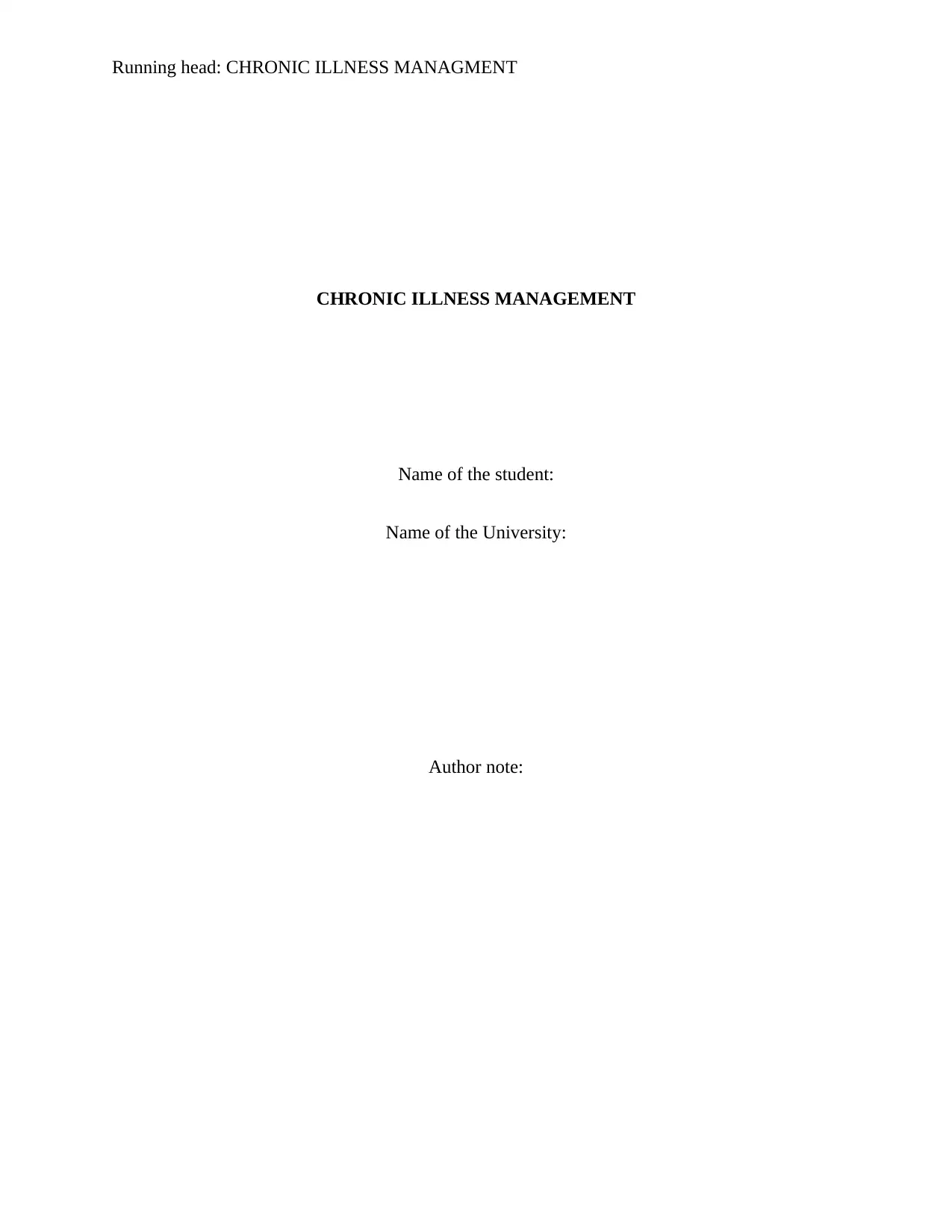
Running head: CHRONIC ILLNESS MANAGMENT
CHRONIC ILLNESS MANAGEMENT
Name of the student:
Name of the University:
Author note:
CHRONIC ILLNESS MANAGEMENT
Name of the student:
Name of the University:
Author note:
Secure Best Marks with AI Grader
Need help grading? Try our AI Grader for instant feedback on your assignments.
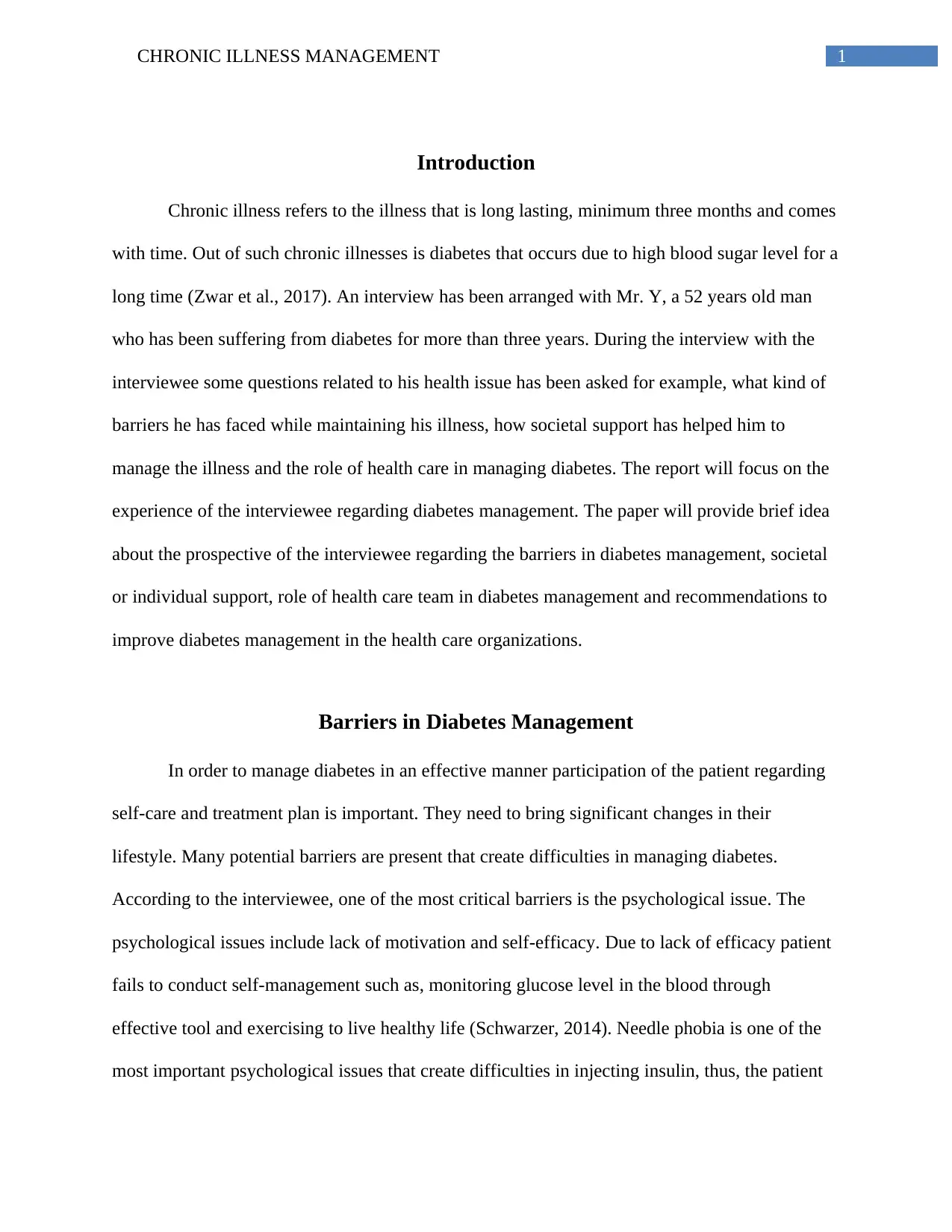
1CHRONIC ILLNESS MANAGEMENT
Introduction
Chronic illness refers to the illness that is long lasting, minimum three months and comes
with time. Out of such chronic illnesses is diabetes that occurs due to high blood sugar level for a
long time (Zwar et al., 2017). An interview has been arranged with Mr. Y, a 52 years old man
who has been suffering from diabetes for more than three years. During the interview with the
interviewee some questions related to his health issue has been asked for example, what kind of
barriers he has faced while maintaining his illness, how societal support has helped him to
manage the illness and the role of health care in managing diabetes. The report will focus on the
experience of the interviewee regarding diabetes management. The paper will provide brief idea
about the prospective of the interviewee regarding the barriers in diabetes management, societal
or individual support, role of health care team in diabetes management and recommendations to
improve diabetes management in the health care organizations.
Barriers in Diabetes Management
In order to manage diabetes in an effective manner participation of the patient regarding
self-care and treatment plan is important. They need to bring significant changes in their
lifestyle. Many potential barriers are present that create difficulties in managing diabetes.
According to the interviewee, one of the most critical barriers is the psychological issue. The
psychological issues include lack of motivation and self-efficacy. Due to lack of efficacy patient
fails to conduct self-management such as, monitoring glucose level in the blood through
effective tool and exercising to live healthy life (Schwarzer, 2014). Needle phobia is one of the
most important psychological issues that create difficulties in injecting insulin, thus, the patient
Introduction
Chronic illness refers to the illness that is long lasting, minimum three months and comes
with time. Out of such chronic illnesses is diabetes that occurs due to high blood sugar level for a
long time (Zwar et al., 2017). An interview has been arranged with Mr. Y, a 52 years old man
who has been suffering from diabetes for more than three years. During the interview with the
interviewee some questions related to his health issue has been asked for example, what kind of
barriers he has faced while maintaining his illness, how societal support has helped him to
manage the illness and the role of health care in managing diabetes. The report will focus on the
experience of the interviewee regarding diabetes management. The paper will provide brief idea
about the prospective of the interviewee regarding the barriers in diabetes management, societal
or individual support, role of health care team in diabetes management and recommendations to
improve diabetes management in the health care organizations.
Barriers in Diabetes Management
In order to manage diabetes in an effective manner participation of the patient regarding
self-care and treatment plan is important. They need to bring significant changes in their
lifestyle. Many potential barriers are present that create difficulties in managing diabetes.
According to the interviewee, one of the most critical barriers is the psychological issue. The
psychological issues include lack of motivation and self-efficacy. Due to lack of efficacy patient
fails to conduct self-management such as, monitoring glucose level in the blood through
effective tool and exercising to live healthy life (Schwarzer, 2014). Needle phobia is one of the
most important psychological issues that create difficulties in injecting insulin, thus, the patient
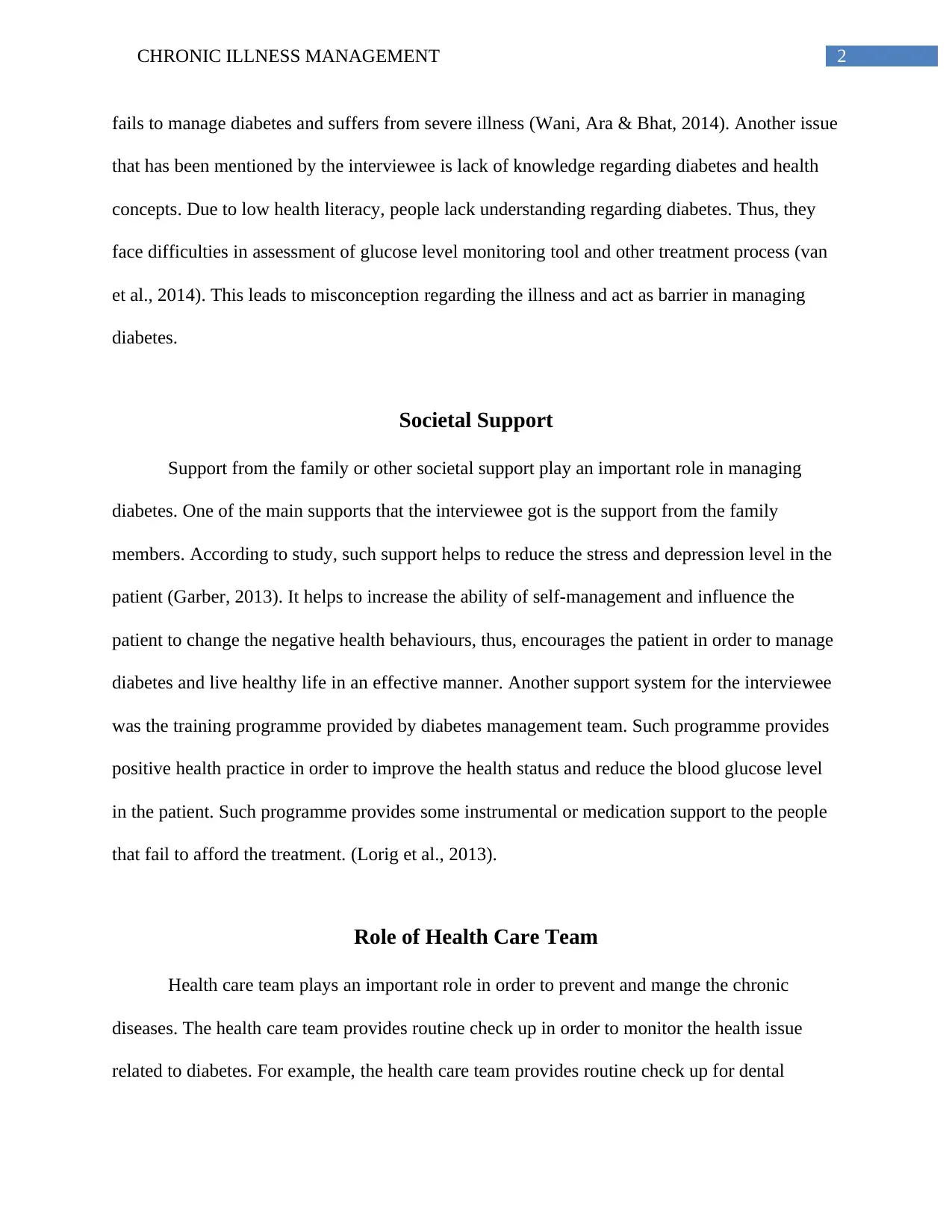
2CHRONIC ILLNESS MANAGEMENT
fails to manage diabetes and suffers from severe illness (Wani, Ara & Bhat, 2014). Another issue
that has been mentioned by the interviewee is lack of knowledge regarding diabetes and health
concepts. Due to low health literacy, people lack understanding regarding diabetes. Thus, they
face difficulties in assessment of glucose level monitoring tool and other treatment process (van
et al., 2014). This leads to misconception regarding the illness and act as barrier in managing
diabetes.
Societal Support
Support from the family or other societal support play an important role in managing
diabetes. One of the main supports that the interviewee got is the support from the family
members. According to study, such support helps to reduce the stress and depression level in the
patient (Garber, 2013). It helps to increase the ability of self-management and influence the
patient to change the negative health behaviours, thus, encourages the patient in order to manage
diabetes and live healthy life in an effective manner. Another support system for the interviewee
was the training programme provided by diabetes management team. Such programme provides
positive health practice in order to improve the health status and reduce the blood glucose level
in the patient. Such programme provides some instrumental or medication support to the people
that fail to afford the treatment. (Lorig et al., 2013).
Role of Health Care Team
Health care team plays an important role in order to prevent and mange the chronic
diseases. The health care team provides routine check up in order to monitor the health issue
related to diabetes. For example, the health care team provides routine check up for dental
fails to manage diabetes and suffers from severe illness (Wani, Ara & Bhat, 2014). Another issue
that has been mentioned by the interviewee is lack of knowledge regarding diabetes and health
concepts. Due to low health literacy, people lack understanding regarding diabetes. Thus, they
face difficulties in assessment of glucose level monitoring tool and other treatment process (van
et al., 2014). This leads to misconception regarding the illness and act as barrier in managing
diabetes.
Societal Support
Support from the family or other societal support play an important role in managing
diabetes. One of the main supports that the interviewee got is the support from the family
members. According to study, such support helps to reduce the stress and depression level in the
patient (Garber, 2013). It helps to increase the ability of self-management and influence the
patient to change the negative health behaviours, thus, encourages the patient in order to manage
diabetes and live healthy life in an effective manner. Another support system for the interviewee
was the training programme provided by diabetes management team. Such programme provides
positive health practice in order to improve the health status and reduce the blood glucose level
in the patient. Such programme provides some instrumental or medication support to the people
that fail to afford the treatment. (Lorig et al., 2013).
Role of Health Care Team
Health care team plays an important role in order to prevent and mange the chronic
diseases. The health care team provides routine check up in order to monitor the health issue
related to diabetes. For example, the health care team provides routine check up for dental
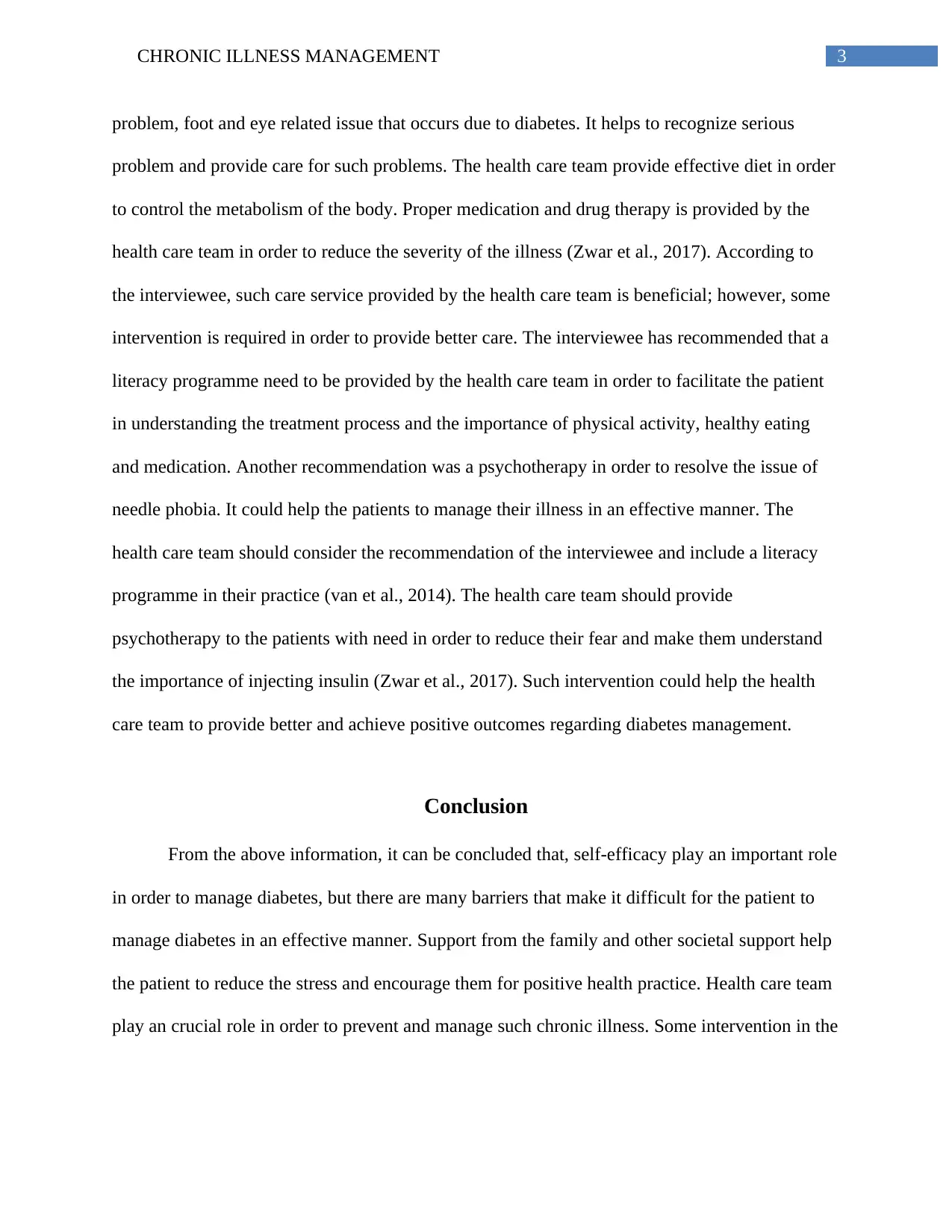
3CHRONIC ILLNESS MANAGEMENT
problem, foot and eye related issue that occurs due to diabetes. It helps to recognize serious
problem and provide care for such problems. The health care team provide effective diet in order
to control the metabolism of the body. Proper medication and drug therapy is provided by the
health care team in order to reduce the severity of the illness (Zwar et al., 2017). According to
the interviewee, such care service provided by the health care team is beneficial; however, some
intervention is required in order to provide better care. The interviewee has recommended that a
literacy programme need to be provided by the health care team in order to facilitate the patient
in understanding the treatment process and the importance of physical activity, healthy eating
and medication. Another recommendation was a psychotherapy in order to resolve the issue of
needle phobia. It could help the patients to manage their illness in an effective manner. The
health care team should consider the recommendation of the interviewee and include a literacy
programme in their practice (van et al., 2014). The health care team should provide
psychotherapy to the patients with need in order to reduce their fear and make them understand
the importance of injecting insulin (Zwar et al., 2017). Such intervention could help the health
care team to provide better and achieve positive outcomes regarding diabetes management.
Conclusion
From the above information, it can be concluded that, self-efficacy play an important role
in order to manage diabetes, but there are many barriers that make it difficult for the patient to
manage diabetes in an effective manner. Support from the family and other societal support help
the patient to reduce the stress and encourage them for positive health practice. Health care team
play an crucial role in order to prevent and manage such chronic illness. Some intervention in the
problem, foot and eye related issue that occurs due to diabetes. It helps to recognize serious
problem and provide care for such problems. The health care team provide effective diet in order
to control the metabolism of the body. Proper medication and drug therapy is provided by the
health care team in order to reduce the severity of the illness (Zwar et al., 2017). According to
the interviewee, such care service provided by the health care team is beneficial; however, some
intervention is required in order to provide better care. The interviewee has recommended that a
literacy programme need to be provided by the health care team in order to facilitate the patient
in understanding the treatment process and the importance of physical activity, healthy eating
and medication. Another recommendation was a psychotherapy in order to resolve the issue of
needle phobia. It could help the patients to manage their illness in an effective manner. The
health care team should consider the recommendation of the interviewee and include a literacy
programme in their practice (van et al., 2014). The health care team should provide
psychotherapy to the patients with need in order to reduce their fear and make them understand
the importance of injecting insulin (Zwar et al., 2017). Such intervention could help the health
care team to provide better and achieve positive outcomes regarding diabetes management.
Conclusion
From the above information, it can be concluded that, self-efficacy play an important role
in order to manage diabetes, but there are many barriers that make it difficult for the patient to
manage diabetes in an effective manner. Support from the family and other societal support help
the patient to reduce the stress and encourage them for positive health practice. Health care team
play an crucial role in order to prevent and manage such chronic illness. Some intervention in the
Secure Best Marks with AI Grader
Need help grading? Try our AI Grader for instant feedback on your assignments.

4CHRONIC ILLNESS MANAGEMENT
service could help them to improve their service and meet the requirements of the patoents so
that they could manage their illness in an effective manner.
service could help them to improve their service and meet the requirements of the patoents so
that they could manage their illness in an effective manner.
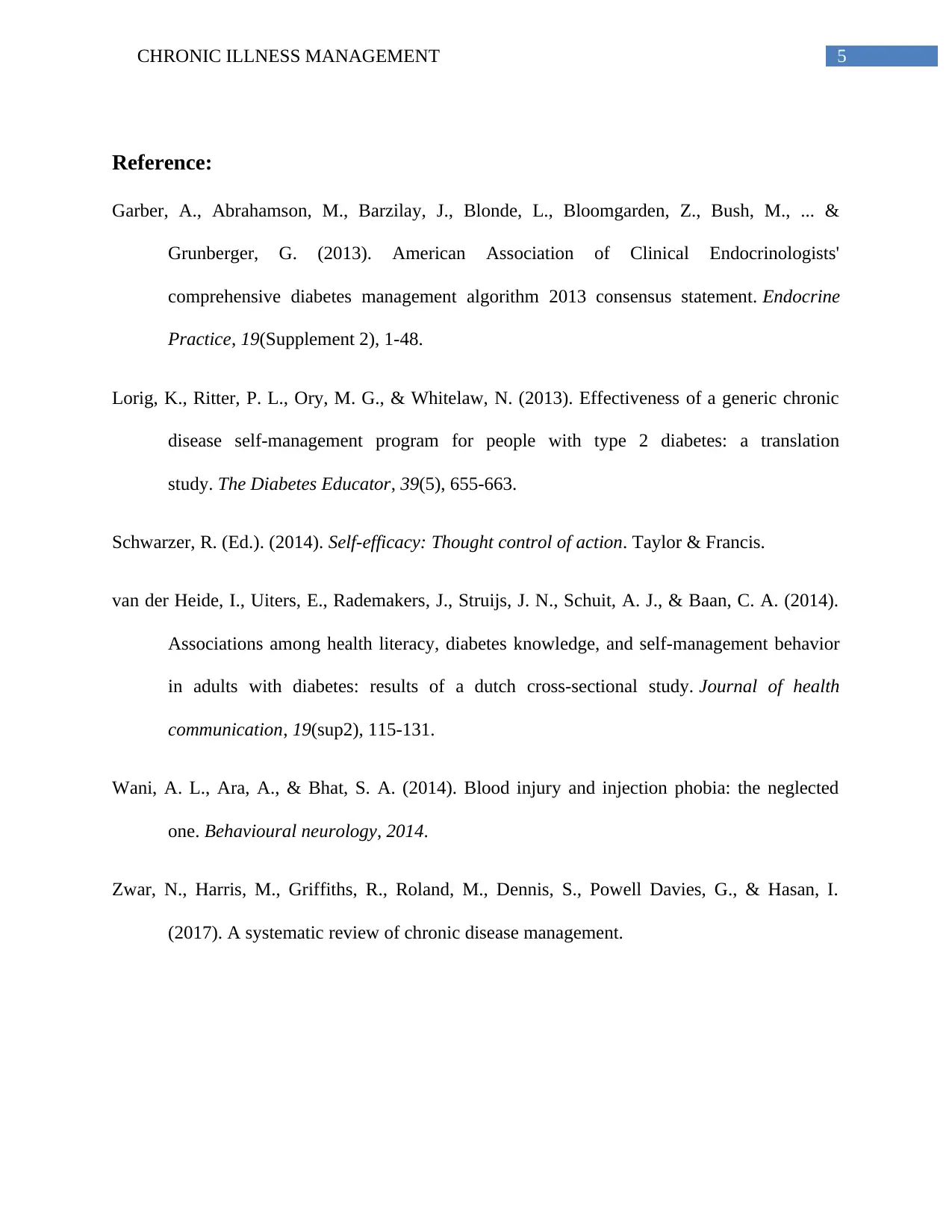
5CHRONIC ILLNESS MANAGEMENT
Reference:
Garber, A., Abrahamson, M., Barzilay, J., Blonde, L., Bloomgarden, Z., Bush, M., ... &
Grunberger, G. (2013). American Association of Clinical Endocrinologists'
comprehensive diabetes management algorithm 2013 consensus statement. Endocrine
Practice, 19(Supplement 2), 1-48.
Lorig, K., Ritter, P. L., Ory, M. G., & Whitelaw, N. (2013). Effectiveness of a generic chronic
disease self-management program for people with type 2 diabetes: a translation
study. The Diabetes Educator, 39(5), 655-663.
Schwarzer, R. (Ed.). (2014). Self-efficacy: Thought control of action. Taylor & Francis.
van der Heide, I., Uiters, E., Rademakers, J., Struijs, J. N., Schuit, A. J., & Baan, C. A. (2014).
Associations among health literacy, diabetes knowledge, and self-management behavior
in adults with diabetes: results of a dutch cross-sectional study. Journal of health
communication, 19(sup2), 115-131.
Wani, A. L., Ara, A., & Bhat, S. A. (2014). Blood injury and injection phobia: the neglected
one. Behavioural neurology, 2014.
Zwar, N., Harris, M., Griffiths, R., Roland, M., Dennis, S., Powell Davies, G., & Hasan, I.
(2017). A systematic review of chronic disease management.
Reference:
Garber, A., Abrahamson, M., Barzilay, J., Blonde, L., Bloomgarden, Z., Bush, M., ... &
Grunberger, G. (2013). American Association of Clinical Endocrinologists'
comprehensive diabetes management algorithm 2013 consensus statement. Endocrine
Practice, 19(Supplement 2), 1-48.
Lorig, K., Ritter, P. L., Ory, M. G., & Whitelaw, N. (2013). Effectiveness of a generic chronic
disease self-management program for people with type 2 diabetes: a translation
study. The Diabetes Educator, 39(5), 655-663.
Schwarzer, R. (Ed.). (2014). Self-efficacy: Thought control of action. Taylor & Francis.
van der Heide, I., Uiters, E., Rademakers, J., Struijs, J. N., Schuit, A. J., & Baan, C. A. (2014).
Associations among health literacy, diabetes knowledge, and self-management behavior
in adults with diabetes: results of a dutch cross-sectional study. Journal of health
communication, 19(sup2), 115-131.
Wani, A. L., Ara, A., & Bhat, S. A. (2014). Blood injury and injection phobia: the neglected
one. Behavioural neurology, 2014.
Zwar, N., Harris, M., Griffiths, R., Roland, M., Dennis, S., Powell Davies, G., & Hasan, I.
(2017). A systematic review of chronic disease management.
1 out of 6
Related Documents
Your All-in-One AI-Powered Toolkit for Academic Success.
+13062052269
info@desklib.com
Available 24*7 on WhatsApp / Email
![[object Object]](/_next/static/media/star-bottom.7253800d.svg)
Unlock your academic potential
© 2024 | Zucol Services PVT LTD | All rights reserved.




